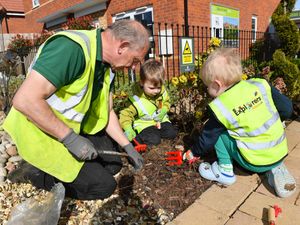Challenge of Reception class children still in the nappy years
Ask Reception staff to list their challenges and the chances are they will include nappy changing.

Children entering the school system are increasingly unprepared to spend their first chunk of time away from home.
That means extra workload for teachers and their assistants, changing nappies, doing up zips and buttons and even helping them to eat.
A new report says nearly half of children are not developmentally ready for Reception.
This means that some children are starting school unable to eat independently, use the toilet or communicate clearly.
The number of Reception children not toilet trained has increased in recent years, although many parents appear unaware of the challenge they are putting upon school staff.
Today’s study suggests nearly nine in 10 parents believe their children are ready to start school when they reach the age of four.
That contrasts with primary school teachers reporting that only 54 per cent of children in their Reception classes were developmentally ready for school when they began.
Teachers believe the problem of school readiness is “growing”, a report from early years charity Kindred2 suggests.
A survey of more than 1,000 primary school teachers in the UK during October and November 2022 found that on average teachers believe 46 per cent of children were not developmentally ready for Reception.
Teachers expect children to be sufficiently independent, able to use the toilet, dress and feed themselves when entering Reception, as well as have basic social, written and verbal skills, the report says.
But nearly three in five teachers report that the number of children who are developmentally behind is either higher or the same as in previous years, according to the poll by YouGov and Kindred2.
A separate poll of more than 1,000 parents of children who started Reception in September 2022 found that 89 per cent, who answered yes or no, said their child was “ready for school”.
The report warns that “limited school readiness” has meant that schools need more staff to be able to support children to focus on basic developmental tasks, such as being able to dress and go to the toilet.
A senior teacher in the West Midlands, who asked to remain anonymous, said: “Teachers often can’t get down to the ‘meat and potatoes’ of teaching the curriculum because they’re doing things like changing wet children, dealing with emotional outbreaks etc. Many of our Reception staff, especially this autumn term, have missed out on their lunches and thus their prep time due to supporting children who can’t feed themselves.”
More than nine in 10 teachers report having at least one child in class who is not toilet trained or who do not have basic language skills, such as being unable to say their name.
The survey suggests 89 per cent of teachers have at least one child in their class who cannot eat independently.
The West Midlands teacher added: “Staff in our school are being pushed to their limit at the moment. Lots of children not toilet trained means two members of staff are having to be released from classes to change a child each time they have an accident.”
Among the teachers who reported a higher proportion of children arriving at school not developmentally ready, 66 per cent said they believe that less time spent in nursery during lockdowns has played a role.
Teachers identified parents spending more time on electronic devices than with their children and not reading to their children as other factors contributing to the school readiness problem.
Some parents assumed it was a school’s responsibility to teach basic skills, like toileting and dressing, the report suggests, but teachers noted that many parents “lack understanding and knowledge” about the key developmental milestones that their children are expected to make in the preschool years.
Felicity Gillespie, director of Kindred2, said: “Too many children are behind before they begin.
“This is because as a nation we are not prioritising the raising of children at the very time in their lives when their brains are most receptive to stimulation and interaction with older children and adults.
“We perpetuate a failure to inform, a lack of support and underfunding that would be unthinkable in the rest of the education sector.
“We allow this in spite of our knowledge that preschool development is an accurate predictor of later life attainment and health. School readiness is not just an early years issue.”
A Department for Education spokesperson said action was being taken, adding: “We recognise that the early years of a child’s life are crucial.
“That is why we’re investing millions in early years recovery over the next three years, including programmes focused on improving children’s speech, language and communication skills.
“We are already seeing children making encouraging progress with two thirds of primary schools using the Nuffield Early Languages Intervention programme along with nearly three million tutoring courses started through the National Tutoring Programme.”




